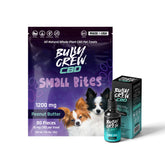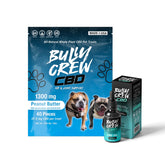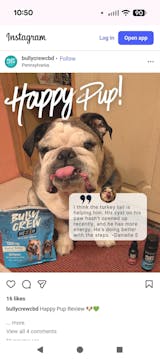For years, man's best friend has been known for chewing up homework, cash, and a variety of other mischievous acts. With the rise in popularity of cannabis-based edibles in the mainstream market, pet owners are facing a new dilemma: My dog ate my edibles. What now? Are gummies bad for dogs? As cannabis legalization gains traction across states, there's a growing concern about pets accidentally consuming cannabis. While cannabis can offer therapeutic benefits for pets, accidental ingestion can pose risks. Here are some important considerations for handling your furry friend's unexpected encounter with cannabis edibles.
How Do You Know If Your dog ate weed gummies?
If you think your dog has eaten cannabis, look for these signs of THC intoxication:
- Lack of coordination or unsteady movement
- Abnormal activity levels
- Dilated pupils
- Increased vocalization
- Excessive drooling
- Vomiting
- Accidental urination
- Increased heart rate
- Changes in blood pressure
- Decreased breathing
My Dog Ate Weed – Are gummies safe for dogs?
Let's start with the active ingredients: THC and/or CBD. Are they harmful to pets? If your dog ate edibles, how long does it last?
If your pet ingests cannabis naturally (such as by eating the flowers or buds, inhaling secondhand smoke, or consuming raw wax), it's the best-case scenario. The effects, while uncomfortable, typically dissipate as the cannabis leaves the body through feces and urine. This process usually takes 6-8 hours but can extend to 24 hours or more with higher doses.
THC and CBD are not fatal to pets, even in large accidental doses. In fact, they can offer various benefits. However, pets not accustomed to such doses may experience uncomfortable side effects known as intoxication, which differs from toxicity. Although veterinarians often refer to it as "THC Toxicity," THC itself isn't toxic but can cause significant intoxication symptoms due to dogs having more cannabinoid receptors than humans, making them more sensitive.
If your pet shows severe intoxication symptoms like those mentioned above, it's advisable to visit the vet. While ingesting cannabis isn't as dangerous as consuming edibles, the resulting side effects are unpleasant. Veterinarians can expedite relief using tools like IV fluids and activated charcoal to stabilize blood pressure and organ function.
If your dog consumes a substantial amount of CBD without THC or as part of a Full-Spectrum Hemp Extract (with a small THC percentage), they're unlikely to experience many, if any, of the listed side effects. CBD lacks THC's psychoactive properties, minimizing or eliminating unpleasant effects.
However, ensure the hemp or CBD your pet consumes doesn't contain other harmful ingredients like Chocolate or Xylitol.
My Dog Ate Edibles – Are Edibles Safe for Pets?
If your dog has consumed edibles from your stash, it's crucial to assess the THC content and carefully observe their symptoms, as mentioned earlier. Additionally, it's vital to check for potentially harmful ingredients like Chocolate and, particularly, Xylitol. These substances can cause serious health risks to dogs and require immediate attention to ensure your pet's well-being.
My dog ate edibles made from Chocolate
If your dog has consumed edibles containing Chocolate, taking immediate action is important. Chocolate can pose serious risks, especially in larger quantities and with higher cacao content (like dark Chocolate, cocoa powder, and cacao nibs). Dogs cannot metabolize caffeine and theobromine, compounds found in Chocolate, which can lead to toxicity. These substances can cause various adverse effects in dogs, ranging from mild symptoms like vomiting and diarrhea to more severe issues such as increased heart rate, tremors, and seizures.
Caffeine and theobromine are stimulants that:
- Accelerate heart rate
- Expand blood vessels
- Stimulate the heart
- Possess diuretic effects
Both of these substances, cannabis, and THC edibles, pose challenges for dogs' metabolism, leading to various side effects that can range from mild to severe.
Minor side effects may include:
- Vomiting
- Diarrhea
- Increased thirst
- Panting
- Excessive urination
- Rapid heart rate
Severe side effects can include:
- Muscle tremors
- Seizures
- Heart failure
It's often not fatal when dogs ingest Chocolate, especially with candies made from milk or lower potency dark chocolate. However, visiting your veterinarian is crucial if your dog has consumed chocolate edibles. Chocolate contains high levels of fat and sugar, which can lead to severe gastrointestinal issues such as pancreatitis, especially in dogs with sensitive stomachs. Moreover, theobromine, a compound in Chocolate, has a long half-life in the bloodstream, necessitating veterinary care for monitoring and hydration to ensure your pet's safety.
My dog ate a gummy that contained Xylitol
If your dog consumed edibles without Chocolate, they likely still contained sugar or artificial sweeteners, particularly Xylitol (also known as birch sugar or birch bark extract). Xylitol poses a greater risk to dogs than Chocolate. This ingredient is highly toxic and can lead to severe complications such as a rapid drop in blood sugar levels, liver failure, and even death in dogs. It's crucial to seek immediate veterinary attention if your dog ingests any product containing Xylitol to prevent serious health issues.
If your dog ate weed gummies containing Xylitol, immediate veterinary attention is crucial. Xylitol, a sugar alcohol naturally found in some fruits, is highly concentrated in candies and sweet treats. It's favored for its low glycemic index, fewer calories, and dental health benefits. Xylitol is present in a wide range of products, including sugar-free gum, cough syrup, gummy vitamins, medicines, and even certain brands of peanut butter (so always check the ingredients!). When consumed by dogs, Xylitol can lead to severe health issues, making swift veterinary care essential to safeguard your pet's well-being.
Xylitol is highly poisonous to dogs because it affects the insulin levels released from their pancreas. This leads to a significant drop in blood sugar, known as hypoglycemia, which can happen as quickly as 10 to 60 minutes after your dog eats it. Ingesting Xylitol can also cause seizures, liver failure, and even death. Keeping products containing Xylitol out of your dog's reach is crucial to protect their health and safety.
Can gummies kill dogs – When to Go to the Vet
- If your pet ate edibles containing toxic ingredients or ingredients you're not familiar with.
- If your pet has swallowed any packaging, which could cause an obstruction.
- If your pet acts lethargic, uncoordinated, or displays other unusual behaviors.
- If your pet has severe or prolonged diarrhea or vomiting.
When your veterinarian suspects your dog has ingested cannabis, they will likely try to induce vomiting to remove any remaining toxins from their stomach. However, because cannabis can prevent vomiting, this might not always be effective. If your dog can't vomit, the vet will give activated charcoal to bind to any remaining toxins or chemicals. They will also monitor your pet with an IV drip to help flush the toxins out more quickly. Trust that your veterinarian has the experience and equipment needed to handle this situation and ensure your dog's safety.
If your pet consumes edibles, the vet will assess the severity of the situation to determine if an overnight stay is necessary. If you respond quickly and your pet vomits the edibles, some vets might allow you to take your pet home, provided you can closely monitor them. Keeping a watchful eye on your pet is crucial to ensure they don't show any signs of distress or ongoing symptoms.
Can I Share My CBD Products with My Dog? Can I give my dog a gummy?
Now that we've discussed the risks of dogs getting into your cannabis stash, you can make more informed decisions about what's safe to share with your pet. Hemp and cannabis products can offer significant benefits to pets, but it's crucial to ensure that all ingredients are safe for them. Always choose products specifically designed for pets, as these are formulated to be safe and beneficial for their health. By being cautious and informed, you can provide your pet with the advantages of hemp and cannabis without putting them at risk.
At Bully Crew CBD, all our Full Spectrum Hemp tinctures and salves are crafted to human-grade standards, ensuring they are safe for both you and your pet. Our tinctures are meticulously formulated without any added flavoring, salts, dyes, preservatives, or harmful additives that could pose risks to your pet's health. For any products containing additional ingredients, it's advisable to reserve them strictly for human use.
CBD Edibles for Dogs
BULLY CREW CBD Pet Treats are crafted using all-natural ingredients and feature whole-plant, full-spectrum hemp extract CBD. Each treat is freshly baked with real, wholesome ingredients to ensure quality and taste. Our CBD products are rich in a variety of cannabinoids that have been shown to potentially support stress management, boost immune health, and alleviate general pain and discomfort.
Conclusion
When considering sharing CBD, THC, or other cannabis products with your pet, purity, and potency are crucial factors to prioritize. Opt for products with clean, straightforward formulas to ensure safety and effectiveness for your dog. Dogs possess a higher density of cannabinoid receptors than humans, meaning even small doses can have significant effects. Always store these products securely out of your pet's reach, regardless of the type you choose to use.
FAQs
1. Can Dogs Have THC?
The benefits of THC for our pets are largely positive and safe, despite its intoxicating effects. Clinical research supports the safety of cannabis and THC, even at high doses.
However, animals may find the experience uncomfortable due to their inability to comprehend being "high". Symptoms of THC ingestion in dogs include lack of coordination, increased vocalization, vomiting, and in severe cases, tremors or seizures. While these effects are distressing, they are not typically life-threatening and will diminish over time.
To prevent accidental ingestion and these symptoms, it's crucial to store THC-containing products out of reach of pets.
2. What Happens if My Dog Eats CBD Gummies? Are gummies bad for dogs?
CBD itself is generally safe for dogs, but CBD gummies made for humans might contain ingredients harmful to them, such as Xylitol or Chocolate. These additives can pose serious risks, like low blood sugar or liver failure in dogs. If your dog eats CBD gummies, check the ingredients for toxins and watch for symptoms like vomiting, tiredness, or seizures. If you fear your dog has ingested toxic substances, seek immediate veterinary care.
3. Is It Okay To Give Dogs Edibles? Can a dog eat gummy?
CBD is generally safe for dogs, but CBD gummies meant for humans can contain harmful ingredients like Xylitol or Chocolate, which are unsafe for pets. Human edibles pose risks because they often include ingredients that are toxic to dogs, such as Xylitol and Chocolate.
Furthermore, the cannabis strains humans use typically have high THC and low CBD levels. Dogs can react poorly to THC if not introduced properly, causing distressing intoxication effects, especially without therapeutic guidance.
When choosing edibles for pets, ensure they are specifically formulated for dogs. Find products with natural ingredients and avoid unnecessary additives. Our CBD dog treats, for example, are designed with pet-safe ingredients and provide a controlled CBD dosage tailored to support canine health.
4. What Should I Do if My Dog Ate My Weed?
If your dog ingests any cannabis products or marijuana, keep a close eye on them for signs of intoxication. Look out for symptoms such as lack of coordination, increased heart rate, and excessive drooling.
It's crucial to promptly take your pet to the veterinarian in these situations:
- If your pet has consumed edibles containing toxic or unfamiliar ingredients.
- If they have eaten any packaging along with the products.
- If they show signs of lethargy, lack of coordination, or other unusual behaviors.
- If your pet experiences severe and prolonged diarrhea or vomiting.








